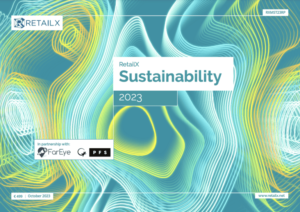The RetailX Sustainability 2023 report, which is available to pre-register for now, has found that sustainability reporting is becoming more standardised as regulations and legislation require retailers to report their targets and actions in certain ways.
Add into the mix an array of certification models and standards specific to different areas of business and product categories and the arena can be confusing to those new to it. Not to mention a never-ending ‘pile of paperwork’ for those who have been working in a sustainability function for years.
Reporting, however, is not just being influenced by those outside the industry. Retailers are actively involved in standards setting as well as campaigning for tighter legislation to control parts of the retail industry and other businesses.
Standardised reporting
Sustainability reporting has been developing in recent years enabling investors, consumers and other stakeholders to evaluate the sustainability performance of listed companies. A large percentage of these companies are choosing to report on their environmental risks, opportunities and subsequent financial impact at year end.
A number of frameworks, regulations and voluntary schemes have evolved, including the Taskforce for Climate-related Financial Disclosures, Global Reporting Initiative (GRI), Sustainability Accounting Standards Board (SASB) and CDP. While different in their depth, metrics and the end audience, there are commonalities and work is ongoing to develop frameworks that are aligned to work for companies in any jurisdiction.
The European Commission has developed its own solution, working closely with GRI and the International Sustainability Standards Board (ISSB) to ensure interoperability with the different reporting standards around the world. The EU’s new legislation requires large, listed companies to report using the resulting European Sustainability Reporting Standards (ESRS). Under the Corporate Sustainability Reporting Directive (CSRD), eligible companies will use the standard for reports published in 2025 based on their 2024 financial year.
Retailers will also need their sustainability information to be audited and made available in a digital format.
Mairead McGuinness, commissioner for financial services, financial stability and capital markets union, called the standard ambitious and an important tool for the EU’s sustainable finance agenda.
“They strike the right balance between limiting the burden on reporting for companies, while at the same time enabling companies to show the efforts they are making to meet the green deal agenda, and accordingly have access to sustainable finance,” she said. Meanwhile, ISSB has launched its own standards “designed to ensure that companies provide sustainability related information alongside financial statements in the same reporting package”.
The standards can be used with any accounting requirement in more than 140 jurisdictions, so provide a global baseline to help companies tell their sustainability story in a robust, comparable and verifiable manner.
“We have consulted very closely with the market to ensure that the standards are proportionate and will result in disclosures that are wholly relevant for investment decision-making,” says Emmanuel Faber, ISSB Chair.
“The global economy needs common reporting standards to reduce fragmentation and drive comparability in climate-related financial data. Built upon the foundation of the TCFD framework, the ISSB Standards provide a global baseline for companies to disclose decision-useful, climate related financial information. Information that is critical for creating more transparent markets, helping achieve a smooth low-carbon transition, and building a more resilient and sustainable global economy,” according to Mary Schapiro, Head of the TCFD Secretariat and Vice Chair for Global Public Policy at Bloomberg LP.

Extended producer responsibility
Retailers in Europe are finding how they operate is under scrutiny increasingly by regulators as well, with new legislation requiring them to take responsibility for their waste, packaging and entire product life cycle. Human rights issues and how companies treat workers through the supply chain are being aligned with international standards and UN guiding principles.
France was the first to introduce legislation that moved retailer responsibility beyond packaging. The French decree 2022-748, which forms part of the country’s Anti-Waste for a Circular Economy Law, requires retailers to include environmental information relating to a product on its label or hang tag. This will enable consumers to evaluate products before purchasing.
However, the amount of information required far exceeds what could be included practically on a small label. The decree calls for detailed information relating to a product’s repairability, recyclability, sustainability, and possibilities for reuse, as well as the percentage of recycled material used in the products, use of renewable resources and the presence of plastic microfibers. Furthermore, information on traceability must be made available, along with the name of the country where the following operations take place: weaving, dyeing, printing and assembly of all materials.
In this way, the French decree puts responsibility for the full life cycle of the product firmly in the hands of the producer. Any product that remains unsold should be reused or recycled and brands are called on to participate actively with recycling organisations for products at the end of their life as well. The penalty for not handling deadstock in an appropriate manner is €15,000.
All of these moves require brands to have visibility of the full supply chain, as well as a way to make product information available in a format that is easily understood by French consumers and other interested parties post-purchase. This raises the importance of digitisation, enabling supply chain traceability and full product life cycle assessments, along with ways to connect data sets with consumer-facing systems – as well as ones used for regulatory reporting and wider cradle to grave industry use.
This feature was authored by Emma Herrod, and appears in the RetailX Sustainability 2023 report. Pre-register and have it delivered straight to your inbox on release. This year’s research highlights the extent to which the RetailX Global Elite 250 are sharing their sustainability journeys with customers and how customers are shopping with sustainability in mind.










